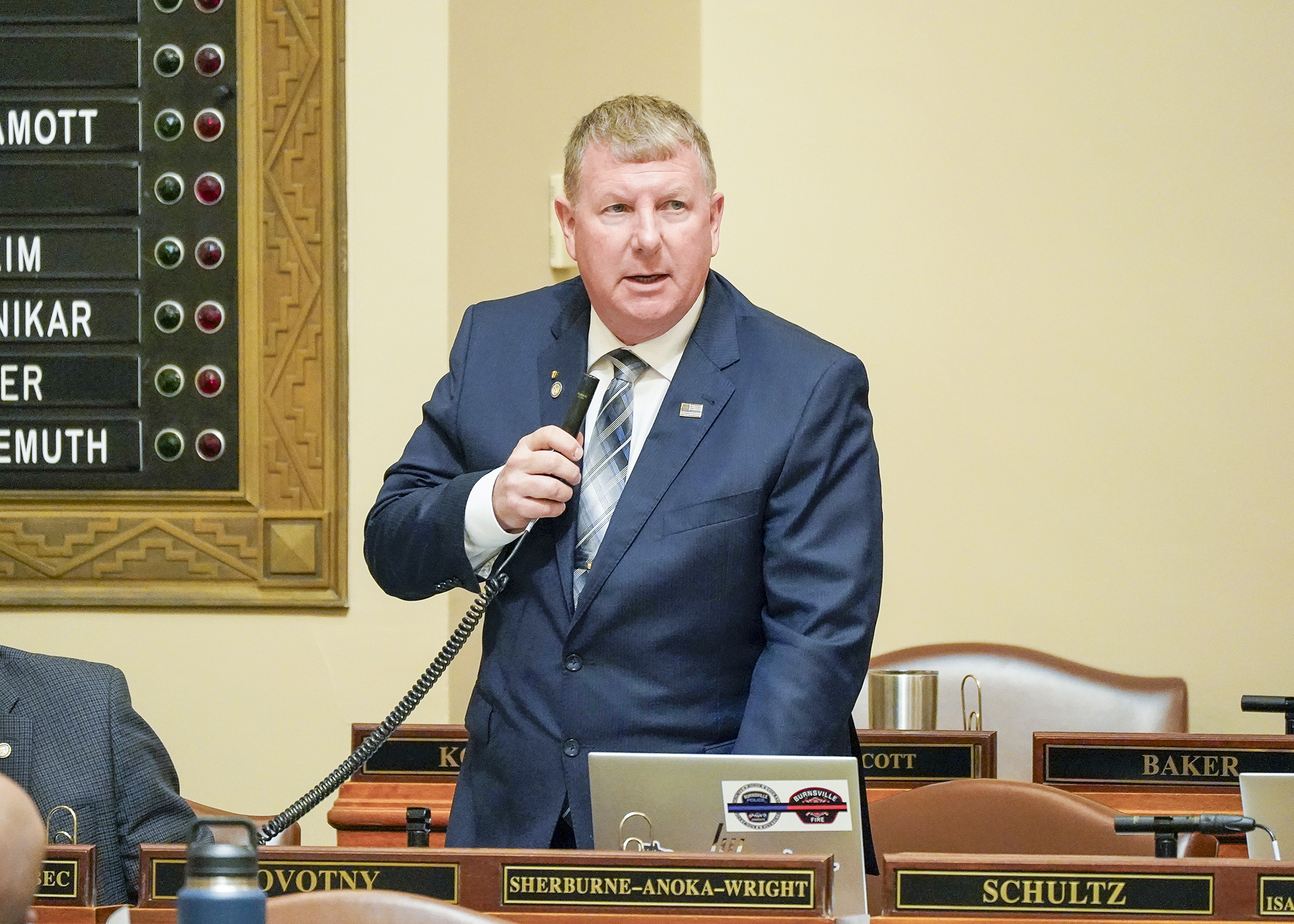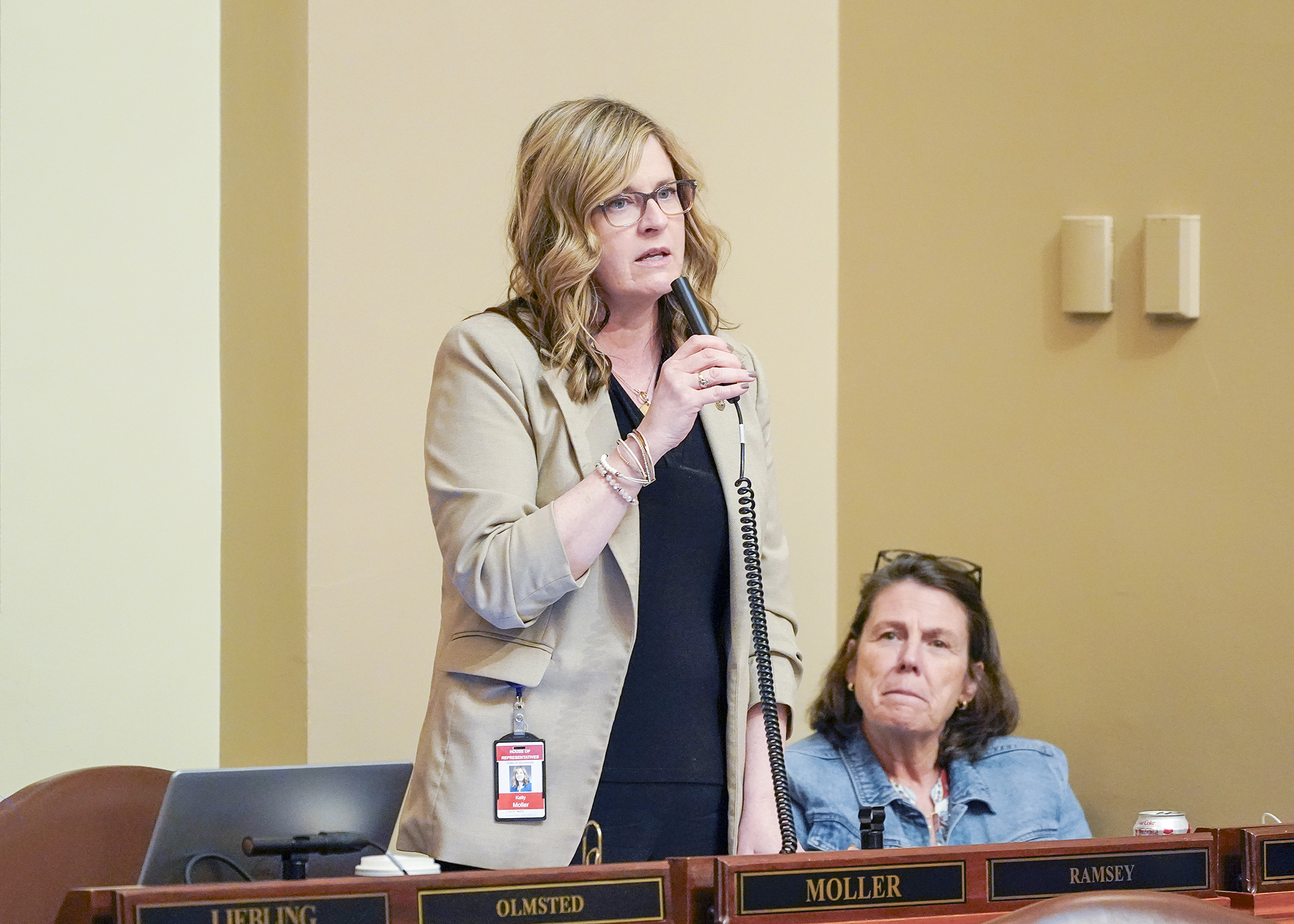House lawmakers OK $3.7 billion public safety, judiciary budget bill

Rep. Kelly Moller (DFL-Shoreview) characterized the $3.66 billion omnibus public safety and judiciary budget bill as a bipartisan effort that funds critical government operations and programs to improve public safety.
Rep. Paul Novotny (R-Elk River), who sponsors the bill, echoed those sentiments and also praised the spirit of compromise that went into crafting it.
Moller and Novotny co-chair the House Public Safety Finance and Policy Committee, and both also said the budget constraints they were working under left them frustrated because a lot of good programs could not be funded.
Moller said the $50 million increase allotted to the committee “doesn’t even come close to covering the operating adjustments for our agencies.”
She said, for example, that the shortfalls would mean the Bureau of Criminal Apprehension would fall behind in processing evidence and it would be harder for investigators of violent crimes to do their work.
 Rep. Kelly Moller speaks to the omnibus public safety and judiciary budget bill on the House Floor April 25. (Photo by Andrew VonBank)
Rep. Kelly Moller speaks to the omnibus public safety and judiciary budget bill on the House Floor April 25. (Photo by Andrew VonBank)Still, she was grateful that crime victim services would get $16 million in new funding in 2026-27 and $4 million in each succeeding biennium.
The House voted Friday 128-4 to pass HF2432, as amended, which sends it to the Senate.
What’s in the bill?
In the public safety sphere, HF2432 would appropriate $2.23 billion for public safety ($50 million above February base) to fund the Corrections and Public Safety departments, Minnesota Sentencing Guidelines Commission, Peace Officer Standards and Training Board, Private Detective Board, Ombudsperson for Corrections, and Clemency Review Commission.
[MORE: Public safety committee considers $2.23 billion budget bill]
In the judiciary sphere, the bill would appropriate $1.43 billion for the judiciary ($30 million above February base) to fund the courts, civil legal services, Guardian ad Litem Board, Tax Court, Uniform Laws Commission, Board on Judicial Standards, Board of Public Defense, and Human Rights Department.
[MORE: Judiciary committee considers $1.43 billion budget bill]
All figures reflect 2026-27 total appropriations from the General Fund.
The bill now goes to the Senate, which is considering SF1417, that body’s judiciary, public safety and corrections policy and finance bill. The two bills are close in total appropriations, with the Senate bill’s bottom line of $3.49 billion.
[MORE: View the fiscal spreadsheets: House; Senate]
Notable policy provisions
The bill has several policy provisions proposing to change public safety and civil/judiciary statutes.
Public safety policy changes would:
- make it a crime to knowingly cause or permit a child to be exposed to, have contact with, or ingest fentanyl;
- extend the statute of limitations for first-degree arson from five to 10 years;
- create a Minnesota Victims of Crime Account to fund crime victim services grants;
- require prisons to maintain an ample supply of opiate antagonists (Narcan) to enable staff to rapidly respond to opioid overdoses;
- mandate consecutive or executed sentences for a person who commits an assault against a sheriff or sheriff’s deputy while the person is an inmate of a local correctional facility; and
- eliminate the Fraud Bureau at the Department of Commerce and transfer its duties to a newly created Financial Crimes and Fraud Section at the Bureau of Criminal Apprehension.
A separate bill with additional public safety policy changes, HF1354, also passed the House Friday on a 133-1 vote.
Select judiciary policy changes would:
- establish private privileges for participants in restorative justice victim-offender conferences;
- allow courts to charge fees for private attorneys to access court documents;
- modify the definition of “custodian” in orders of protection; and
- modify procedures for foreclosure sales.
An amendment sets off a rules debate
Rep. Max Rymer (R-North Branch) unsuccessfully offered an amendment that would have required local governments to cooperate with federal immigration agencies. Rymer said the amendment would increase public safety by helping immigration authorities deport violent criminals.
Opponents said it would decrease public safety by discouraging immigrants, documented or not, to come forth and report crimes due to a mistrust of local law enforcement officers.
It eventually failed on a 67-67 tie vote, but not before triggering a highly partisan debate on whether the amendment was germane under House rules. Democrats called the Rymer amendment not germane, and they appealed a ruling by House Speaker pro-tempore Rep. Bjorn Olson (R-Fairmont) that went against them.
Democrats argued Olson’s ruling violated the Feb. 5 power-sharing agreement negotiated between the Republican and DFL caucuses. Republicans argued that the agreement’s clause cited by Democrats didn’t apply to the specific situation.
Related Articles
Search Session Daily
Advanced Search OptionsPriority Dailies
Speaker Emerita Melissa Hortman, husband killed in attack
By HPIS Staff House Speaker Emerita Melissa Hortman (DFL-Brooklyn Park) and her husband, Mark, were fatally shot in their home early Saturday morning.
Gov. Tim Walz announced the news dur...
House Speaker Emerita Melissa Hortman (DFL-Brooklyn Park) and her husband, Mark, were fatally shot in their home early Saturday morning.
Gov. Tim Walz announced the news dur...
Lawmakers deliver budget bills to governor's desk in one-day special session
By Mike Cook About that talk of needing all 21 hours left in a legislative day to complete a special session?
House members were more than up to the challenge Monday. Beginning at 10 a.m...
About that talk of needing all 21 hours left in a legislative day to complete a special session?
House members were more than up to the challenge Monday. Beginning at 10 a.m...